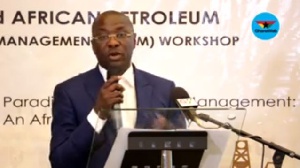The Ghana National Petroleum Corporation would soon make public key economic and commercial data to improve transparency and promote public accountability.
Government intends to do this after GNPC completes the framework to guide this process of making known key data to the public as it recognises that issues relating to the commercial relationship between the country’s oil corporations and investors has become matters of public interest.
Disclosing this at the opening of the third African Petroleum Data Management (APDM) workshop in Accra, Dr Mohammed Amin Adam, Deputy Minister of Energy, intimated that this initiative has become necessary to clarify misconceptions and suspicions by citizens on the operations of oil companies in the country.
He noted that by this, GNPC hopes to set a good example that will attract all other operators in the sector to do so, to deepen public trust and promote transparency and accountability.
“The Government of Ghana recognises that by the nature of the Ghana National Oil Corporations, its commercial relationship with partners and the market involve public interest issues. To this effect, GNPC will soon publish its public disclosure framework to guide the disclosure of key economic and commercial data to improve transparency and advance the course of public accountability. This has become necessary because national oil companies are often viewed with suspicion by citizens and through this the GNPC hopes to provide leadership in demystifying this perception,” he said.
The Deputy Energy Minister also hinted that government is expected to present the General Petroleum Regulations to Parliament to facilitate “access to all economic and infrastructure data relating to the petroleum industry” and “disclosure of beneficial ownership detail of contractors and licensees.”
This, he stressed would ensure information about the petroleum industry are readily made available to Ghanaians and investors, open the sector up for scrutiny and enhance transparency and accountability.
“I would like to announce that when passed, one of the major requirements of the regulations on the Petroleum Register is the disclosure of beneficial ownership details of contractors and licensees. Other relevant information to be disclosed through the register will include licenses to install and operate facilities for transport, treatment and storage of petroleum, permits to commence installation and operation of a facility for transport, treatment and storage of petroleum, production and injection permits for petroleum or water, flaring or venting authorisations for natural gas, unitisation agreements, area coordination agreements, long-term sale of natural gas agreements and permitted mortgages of participating interests in petroleum agreements,” he emphasised.
Buttressing the relevance for accurate data in the petroleum industry, CEO of Petroleum Commission, Egbert Faibille explained that the success of every business is hinged on the availability of accurate data.
He observed that one of the challenges faced in data management is inability to maintain and keep information acquired through improper labelling or wrong storage.
The Petroleum Commission CEO argued that the industry players are constantly at risk of making bad investment decisions because of poor quality of data.
“The oil and gas industry requires very high investments. The risk of a bad decision based on poor data quality greatly increases business risk exposure, poor return on investment and ultimately, sub-optimal resource management. It is a well-known fact in the Oil and Gas industry that about 70% of the effort and time spent on deriving value from data is spent on data preparation. One of the Key challenges of Data Management is “dark data”.
“This is data that cannot be retrieved or found due to mislabelling, inadequate metadata records or loss in transition. This causes lost value to petroleum business and leaves knowledge gaps in the understanding of the petroleum resources and assets that need to be managed,” Egbert Faille remarked in his welcome address at the three-day workshop in Accra.
Business News of Wednesday, 20 June 2018
Source: www.ghanaweb.com













